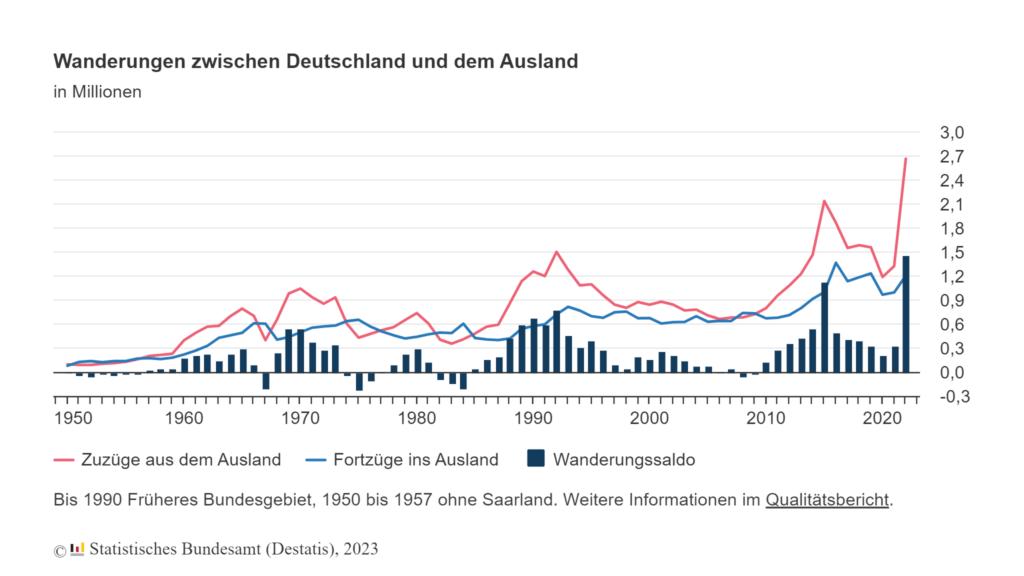Moving to Germany: A Comprehensive Guide for Expats

Germany has become a highly sought-after destination for individuals seeking new horizons and prospects. People from all over the world are drawn to this culturally rich, economically thriving, and safe country for a multitude of reasons. From academic pursuits to professional growth, Germany offers a welcoming environment that attracts expats looking to embark on exciting new chapters in their lives.
As an expat-focused resource, our aim is to assist and support individuals who are considering or planning a move to Germany. Whether you’re a student looking to pursue higher education in one of Germany’s esteemed universities or a professional seeking career advancement in a thriving job market, we are here to guide you through your individual relocation process.
At our platform, we are dedicated to providing valuable resources, expert guidance, and practical tips to help expats navigate the complexities of moving to Germany. From German visa requirements and residence permit, finding suitable accommodation and residence registration to getting german health insurance, opening a bank account and understanding the local culture and integrating into the community, we are committed to ensuring a smooth and successful transition.
Whether you’re embarking on a study program or pursuing professional aspirations, we are excited to be part of your journey and provide the assistance you need to make your move to Germany a successful and memorable one.
General Overview of immigration in Germany
Moving to Germany has become an increasingly popular choice for individuals seeking new opportunities and experiences. Each year, a significant number of people choose to relocate to this vibrant country in the heart of Europe. According to statistics from the Federal Statistical Office Germany (1) the number of immigrants to Germany has shown an almost steady growth over the years.

In 2022 alone, 2,7 million individuals immigrated to Germany, while approximately 1,2 million people emigrated from the country. This resulted in a net migration gain of 1,5 million individuals. Notably, the states of North Rhine-Westphalia, Bavaria, and Baden-Württemberg witnessed the highest influx of immigrants.
Germany, with a population of approximately 81.9 million people in 2021, is a diverse and multicultural nation. The country is home to more than 22.3 million people with a migration background, representing over one-fourth (27.2%) of the total population. (2)
As the allure of Germany continues to attract individuals from around the world, this comprehensive guide aims to provide valuable insights and information for those considering a move to this captivating country. Whether you’re enticed by career opportunities, the renowned education system, cultural richness, or the high standard of living, this guide will help you navigate the process of relocating to Germany
Shortage of Skilled Workers in Germany: Reasons and Opportunities
Germany’s economy is currently grappling with a shortage of skilled workers across various sectors such as healthcare, gastronomy, skilled trades, and logistics. This shortage has created a promising opportunity for expats planning to come to Germany, as they possess the qualifications and expertise needed to fill these gaps and contribute to the country’s workforce.

Companies in Germany are actively seeking qualified personnel to address their staffing needs, making it an ideal destination for expats looking for career growth and new opportunities. The shortage of skilled workers is not only a challenge for businesses but also a significant future business risk, as the absence of suitable professionals can lead to operational disruptions and hinder economic growth. As a result, there is a high demand for talented individuals from various professions, and expats with the necessary qualifications and expertise are in a favorable position to secure attractive job prospects.
Germany’s positive economic landscape, characterized by a strong and stable economy, creates a conducive environment for professional advancement and success. The country’s commitment to innovation, technological advancements, and sustainable development fosters a climate that encourages professional growth and entrepreneurship. Expats who bring their expertise to Germany can contribute to bridging the skills gap in the labor market, supporting the continued success of German industries and driving forward key sectors.
Moreover, Germany offers a safe and welcoming environment for expats, with a high standard of living and excellent social benefits. The country’s efficient infrastructure, reliable healthcare system, and comprehensive social security contribute to a high quality of life. Expats and their families can enjoy a range of cultural experiences, access to world-class educational institutions, and a vibrant international community that promotes diversity and intercultural exchange. (3)

Reasons to Move to Germany
- Career Opportunities: Germany offers a strong job market with a demand for skilled workers, especially in sectors like IT, healthcare, and logistics. Expats have the opportunity to find attractive job prospects and contribute to bridging the skills gap in the German workforce.
- Quality Education: Germany is renowned for its high-quality education system, with esteemed universities and research institutions. Expats can pursue academic excellence and benefit from a diverse range of study programs taught in English and German.
- Standard of Living: Germany provides a high standard of living, efficient infrastructure, and comprehensive social benefits. Expats can enjoy access to excellent healthcare, reliable public transportation, and a wide range of cultural and recreational activities.
- Safe and Welcoming Environment: Germany is considered a safe and welcoming country, offering a secure environment for individuals and families. The country values diversity and promotes intercultural exchange through its vibrant international community.
- Financial Stability: Germany has a strong and stable economy, offering favorable financial opportunities and prospects for career growth. Competitive salaries and worker protections contribute to a rewarding professional experience.
- Cultural Richness: Germany is culturally rich, with a rich history, art, music, and diverse traditions. Expats have the chance to immerse themselves in German culture, explore historic landmarks, and participate in exciting cultural events.
- International Networking: Germany attracts a significant number of expats, creating a vibrant international community. This offers expats the opportunity to network, make new connections, and engage in intercultural experiences.
- Travel and Central Location: Germany’s central location in Europe makes it an ideal base for travel and exploration. Expats can easily explore neighboring countries and enjoy the diverse landscapes and cultures of the European continent.

Who needs a Visa in Germany?
EU citizens and citizens of Iceland, Liechtenstein, Norway, and Switzerland have the right to live and work in Germany. They only need to register their residence with the appropriate citizen’s office after arriving in Germany.
Non-EU foreigners wanting to stay in Germany for work or study longer than 90 days automatically need a visa for Germany before arriving.
Exempted from this rule are nationals of Australia, Canada, Great Britain, Israel, Japan, New Zealand, South Korea, and the United States. They may apply for the necessary residence permit after arrival in Germany. This also applies to Andorra, Brazil, El Salvador, Honduras, Monaco, and San Marino citizens who do not intend to work in Germany.
Germany Visa: Application procedure
Visa applications and all necessary documents must be submitted in person at the German mission responsible for their place of residence. This process can be very time-consuming, so you should submit your application well in advance of the departure date and make sure you have all relevant documents in good order. Generally, Visa application forms can be obtained from the mission free of charge and must be submitted must be original versions in the appropriate language of the mission in question.

German Visa: Processing times
For short-stay visas (Schengen Visa), the German missions have processing times between two and ten working days. During the peak travel season, there may be an additional waiting period for making an application to a German mission
For longer stays, i.e. residence or work permits, it may take several months until the documents are processed and the permit is issued. As Missions may only issue visas once they have obtained the approval of the foreigners authority in Germany, the visa application procedure can regularly take up to three months, in some cases longer, before being completed.
Note: The foreigners authorities (Ausländerbehörde) are also responsible for measures and decisions pertaining to residence law for foreigners already residing in Germany.
What is the difference between a Visa and a Residence Permit?
The distinction between a visa and a residence permit is important when planning to stay in Germany. A visa grants entry for a maximum of 90 days and is not required for citizens of certain countries. However, citizens of countries like China, India, Russia, and most of Africa must apply for a visa to enter Germany. On the other hand, a residence permit allows for longer-term stay and is necessary for living in Germany.
Temporary Residence Permit in Germany
As a general rule, visa holders must apply for a residence permit (Aufenthaltserlaubnis) after entering Germany. Long-term national visas are issued for particular purposes and are valid for up to a year. During that time, you can – depending on the specifications in the permit- study, work, or engage in other activities in the country.
The temporary residence permit is typically the initial type of permit obtained by most foreign nationals. It creates a basis for a more permanent stay in Germany, as one of the requirements to obtain a permanent permit is to have held the temporary permit for a specified period of time.
Depending on the length of your stay and the requirements you fulfil, there are various types of German residence permits. If you are unsure which permit you need to apply for, you can either check the website of the German Federal foreign office or ASK US TO CONSULT YOU ON THIS ISSUE.
Work Visa in Germany
In general, non-EU nationals need a residence title (visa or residence permit) to take up employment in Germany. By law the residence title has to give information on whether and to which extent access to the labor market is granted. This information replaces the former work visa. If you intend to work in Germany, you have to apply for a visa with the relevant German mission abroad before entering Germany.
If you are a so-called skilled worker, i.e. you have a university oder educational degree that is recognised by Germany, you can also directly apply for a EU Blue Card.

Blue Card Visa Germany
The Blue Card is the main residence permit for university graduates from abroad. Blue Cards are generally valid for at least 24 months, or, if a work contract is for a shorter period, a further 3 months after the contract ends. The German “Blue Passport” entitles holders to enter, re-enter and stay in Germany.
The card affords the holder equal treatment to EU nationals in areas such as employment conditions, freedom of association, educational and vocational training, mutual recognition of diplomas, social security and access to goods and services. In Addition, with a EU Blue Card you can be accompanied by your close family members, who also have the right to work in Germany.
Requirements for a Blue Card:
To be elegible for a Blue Card you need to fill following requirements:
- You will need either a valid work contract or a firm job offer for highly skilled employment lasting at least 6 months.
- You must provide documents that validate your professional qualifications.
- Valid travel (and where required visa) documents;
- Evidence of having applied for health insurance if this is not covered in the work contract.
Applying for a EU Blue Card can be a complicated process. Applications are often rejected because of incorrect or incomplete documentation. Another common reason for the rejection of an application is that the vacancy may be filled by a German national, EU citizen or third-country citizen already legally living in the EU or that your home country has a lack of qualified workers in the profession concerned.
Moving to Germany from a different EU-Member state
EU/EEA and Switzerland citizens can freely move to Germany and work in any profession and do not need to fulfill the in-demand or salary criteria.
Non-European Union (EU) citizens who hold a long-term resident status granted by another EU member state are entitled to expanded mobility privileges in other EU countries.
To be eligible for these extended benefits, you must have resided continuously in an EU member state for a minimum of five years and obtained an EU long-term residence permit there.
With this permit, you will enjoy more favorable conditions for establishing residence in nearly all other EU member states, excluding Ireland and Denmark.
Note: Since Brexit, UK citizens are also considered non-EU citizens.
Is it possible to move to Germany without a Job?
If you are a non-EU national, you cannot live in Germany longer than 90 days, unless you are working or studying. If you want to come to Germany for work, but haven’t found an employment yet, you can apply for a temporary job-seeker visa.
The job seeker visa allows third-country nationals to enter Germany and look for employment within a time frame of six months. At the end of the time frame, if you’ve managed to find employment, you can simply apply for a work visa and a residence permit in Germany.
Note: If you already have a valid work contract, you do not need to apply for a job seeker visa.

Requirements for a Job Seeker Visa:
To be elegible for a job seeker visa you need to fulfill following requirements:
- You are a non-EU (Third-country) national requiring a visa to enter Germany.
- You have a minimum of five years of professional experience in your respective field.
- You possess sufficient financial resources to sustain your stay in Germany.
- You can provide evidence of completed academic or vocational training.
- Your qualifications have been recognized in Germany or are deemed equivalent to a diploma obtained in the country.
An overview of the costs of moving to Germany
When calculating the budget for moving to Germany, several factors come into play. These include visa and immigration fees, moving and accommodation costs, transportation expenses, language course fees (if applicable), health insurance costs, and general living expenses. You may also be interested in our detailed blog post “How much does it cost to move to Germany?“.
Let’s explore each of these aspects:

Visa and Immigration Fees:
Non-EU citizens may need to pay fees for visa applications and residence permits. The processing fee for Schengen visas is generally 80 euros, while national visas for longer stays cost 75 euros. It is important to check the specific requirements and fees associated with the visa category you fall under.
Moving costs:
The actual cost of moving can vary depending on factors such as the distance, the volume of belongings, and the chosen moving method (airfreight, shipping, etc.). It is advisable to obtain quotes from moving companies to get an estimate tailored to your specific needs. Additionally, it’s essential to budget for any additional expenses related to packaging materials, customs duties (if applicable), and insurance coverage for your belongings during transit. Properly assessing and accounting for these moving costs will contribute to a smooth and well-planned relocation process.
Accommodation Costs:
The cost of housing in Germany can vary significantly based on factors such as location, size, and type of accommodation. Rent or purchase prices differ across regions, with cities like Munich or Frankfurt generally having higher housing costs compared to smaller towns or rural areas. Our partners “Move to Berlin” and “Homelike” can help you find suitable long-term or short-term, furnished or unfurnished apartments.
Transportation Costs:
Public transportation expenses, including monthly passes or ticket fares, should be factored in. Germany has a well-developed public transportation system, but costs can vary depending on the region and travel frequency.
It’s worth noting that since 2023, there is a €49 ticket available, allowing unlimited use of public transport throughout Germany for a monthly price.

Health Insurance Costs:
Health insurance is mandatory in Germany, and the costs will depend on various factors such as income, age, health condition, and the type of coverage (public or private insurance). For students, the average monthly health insurance cost is around €117.50 until the age of 23. For individuals without children, the premium starts at 120.34€ per month.
In Germany, employees are tipically covered by the public health insurance system, with monthly premiums shared by the employee and employer. The current contribution rate is 9.3% of the employee’s gross income, providing comprehensive healthcare coverage.
Private health insurance in Germany offers individuals the option of additional coverage and more extensive medical services. It is a suitable choice for higher-income individuals who seek personalized healthcare and faster access to specialists.
Self-employed individuals can choose between public and private health insurance, with public insurance available for lower income levels and private insurance offering greater coverage flexibility but higher premiums.
Learn more about health insurance below in this article.
General Living Expenses:
Monthly living expenses in Germany encompass various aspects such as groceries, dining out, entertainment, personal care items, utilities (electricity, water, heating), internet, and mobile phone plans. These costs can vary depending on the region, the size of accommodation, and personal usage. The average monthly living expenses for a single person in Germany range from around €850 to €1,500, depending on individual circumstances and lifestyle choices.
Language Course Costs:
If you don’t already speak German, taking language courses to improve your language skills might be beneficial. The cost of language courses can vary depending on the duration, intensity, and type of course (group classes, private lessons, online courses). Researching language schools and comparing their offerings can help you find suitable and affordable options.

City Registration Germany: A Guide to Anmeldung
When moving to Germany, one of the first important tasks on your to-do list is completing the city registration, known as Anmeldung. The Anmeldung process involves registering your residence with the local registration office, also known as the Einwohnermeldeamt or Bürgeramt.
Why is City Registration Necessary?
City registration is a legal requirement for anyone residing in Germany. It serves several purposes:
- Proof of Residence: The registration process establishes your official address in Germany and provides proof of your residence status.
- Legal Compliance: Registering your residence is mandatory under German law. Failure to complete the Anmeldung within the required timeframe can result in fines or penalties.
- Administrative Purposes: City registration is essential for various administrative tasks, such as obtaining a tax identification number, enrolling in public health insurance, opening a German bank account, and accessing other public services.
When to Complete the City Registration?
You must complete the city registration within two weeks of moving into your new residence in Germany. The two-week period starts from the day you physically occupy the new address. It is crucial to meet this deadline to ensure compliance with German regulations.
What Documents Do You Need?
To complete the city registration process, you will typically need the following documents:
- Personal Identification: Bring your valid passport or national identity card (Personalausweis) to verify your identity.
- Proof of Residence: Provide a rental agreement (Mietvertrag) or confirmation from your landlord (Wohnungsgeberbestätigung) as proof of your residence. The Wohnungsgeberbestätigung should be completed and signed by your landlord, confirming your move-in date.
- Additional Documents: Depending on the specific requirements of your local registration office, you may be asked to provide additional documents such as a visa, work contract, or proof of health insurance. It is advisable to check with your local registration office beforehand to ensure you have all the necessary paperwork.

How to Complete the City Registration?
To register your residence, follow these steps:
- Locate the Local Registration Office: Find the Einwohnermeldeamt or Bürgeramt responsible for your area of residence. This can usually be found on the official website of your city or town.
- Gather the Required Documents: Ensure you have all the necessary documents mentioned above, including personal identification and proof of residence.
- Visit the Registration Office: Go to the registration office in person during their opening hours. Present your documents to the responsible officer at the designated counter.
- Fill out the Registration Form: Complete the registration form provided by the officer. Provide accurate information about your personal details and new address.
- Submit the Documents: Submit your completed registration form, personal identification, and proof of residence to the officer.
- Confirmation and Certificate: After reviewing your documents, the officer will process your registration. Once completed, you will receive a confirmation of your registration (Meldebestätigung) or a registration certificate (Anmeldebescheinigung) as proof of your registration.
Do the residence registration online and in English
Are you looking for a convenient and hassle-free way to register your residence in Germany? Look no further! Our online service allows you to complete the registration process in English, eliminating the language barrier and providing you with a smooth experience.
Here’s how it works:
- Fill out the Form in English: Unlike the traditional German forms, our system provides you with an English version of the registration form. Simply fill out the form provided below, and our system will automatically transfer your data onto the German original form.
- Secure Payment: To access our service, a one-time payment is required. You can conveniently make the payment through PayPal or credit card.
- Instant Document Delivery: Once your payment is confirmed, we will immediately send you the completed registration form (Anmeldeformular), the landlord confirmation (Wohnungsgeberbestätigung), and even the filled-in broadcast license application (Rundfunkbeitrag). We included the broadcast license application to simplify the process for you, as it is required for all residents in Germany.
- Print and Sign: Simply print out the provided forms and sign them. Make sure your landlord also signs the landlord confirmation.
- Appointment at the Registration Office: We provide you with a step-by-step guide on how to make an appointment at your local registration office or, if applicable, drop in and draw a waiting number.
- Required Documents: When attending your appointment, bring along the necessary documents, including the registration form, landlord confirmation, passport, rental contract, and visa (if applicable). If you are registering with your spouse and children, additional documents such as the marriage certificate and children’s birth certificates may be required.
- Free Language Guide: As an added bonus, we offer a complimentary German language guide, “At the Registration Office,” which provides useful words and phrases to assist you during the registration process.
- Registration Confirmation: During your visit to the registration office, a German official will review your documents. Once everything is verified, you will receive the registration confirmation (Meldebescheinigung). It is crucial to carefully check the document for any errors, as the registration confirmation will be needed for future contracts in Germany. Keep it in a safe place for future reference.
With our Online Residence Registration Service, you can conveniently complete the registration process in English, saving you time and effort. Say goodbye to language barriers and let us assist you in registering your residence in Germany smoothly and accurately.
Remember to keep a copy of the registration confirmation or certificate, as you may need it for various administrative purposes during your stay in Germany.
Completing the city registration in Germany is an important step in establishing your legal presence and accessing various services in the country. By registering your residence within the specified timeframe and providing the required documents, you ensure compliance with German regulations and enjoy a smooth transition into your new home.

Health Insurance in Germany
Welcome to Germany! If you’re planning to work and stay in the country for more than 3 months, it’s important to be aware of the bureaucratic rules. One of the key requirements within the first 3 months is obtaining health insurance. In this article, we will provide you with essential information about the different types of health insurance available in Germany and offer valuable tips to ensure your well-being. Let’s get started on your journey to understanding and securing the right health insurance coverage.
Is health insurance mandatory?
Yes, health insurance is mandatory for everyone who is a resident in Germany. This applies to both German citizens and expatriates. It is a legal requirement to have health insurance coverage to ensure access to healthcare services.
Germans who are unable to afford health insurance due to low or no income may be eligible for subsidies provided by the state to ensure they have access to necessary healthcare.
For expatriates who have recently moved to Germany, navigating the complexities of the German healthcare system can be challenging.
If you’re uncertain about which type of health insurance to choose or want to understand the advantages and disadvantages of each option available to employees, continue reading for more information. Having a work contract provides you with options for health insurance coverage, and understanding the details can help you make an informed decision.
Does germany have universal healthcare?
Yes, Germany has a universal healthcare system. It is often referred to as the Statutory Health Insurance (Gesetzliche Krankenversicherung) system. Under this system, every resident in Germany is required to have health insurance coverage. The system is based on the principle of solidarity, where individuals contribute to the insurance fund based on their income, and in return, they have access to a wide range of healthcare services.
The universal healthcare system in Germany provides comprehensive coverage, including medical treatments, medications, hospital care, and preventive services. Patients have the freedom to choose their healthcare providers and can receive care from both public and private healthcare providers.
While the majority of the population is covered by the Statutory Health Insurance system, individuals with higher incomes or certain professional statuses have the option to choose private health insurance instead. However, private health insurance must provide coverage that is at least equivalent to the benefits offered by the statutory system.
Overall, Germany’s universal healthcare system aims to ensure that all residents have access to high-quality healthcare services, regardless of their income or social status.

Private vs Public health insurance germany
In Germany, individuals have the option to choose between private and public health insurance. Here are some key differences between the two:
- Eligibility:
- Public Health Insurance (Gesetzliche Krankenversicherung, GKV): In General available for every employee, freelancer and self employed. Students and individuals with low income can also join the public health insurance system. Nevertheless, it makes more sense for people who have a very high income (from 66,600 euros per year) to enter into private health insurance.
- Private Health Insurance (Private Krankenversicherung, PKV): Generally available for individuals with higher incomes (currently around 66,600 euros per year in 2023) or specific professional groups, such as self-employed individuals, civil servants, and freelancers. Students and certain other groups may also opt for private insurance.
- Contributions:
- Public Health Insurance: Contributions are based on a percentage of income (currently around 14.6% of gross income, shared between the employee and employer). There is an additional supplemental contribution (currently around 1-1.5%) that is solely paid by the employee.
- Private Health Insurance: Contributions are determined based on factors such as age, health condition, desired coverage, and the chosen insurance provider. The premium is typically calculated individually for each person and may increase with age.
- Coverage and Benefits:
- Public Health Insurance: Offers a standardized package of benefits defined by law. The coverage includes essential medical services, such as doctor visits, hospital treatment, prescription medications, and preventive care. Co-payments may be required for certain services.
- Private Health Insurance: Provides more flexibility and customizable coverage options. Depending on the chosen plan, individuals may have access to additional services, shorter waiting times, and a wider network of doctors and specialists. However, coverage and benefits vary among private insurers and different plans.
- Dependents and Family Members:
- Public Health Insurance: Family members, including spouses and children, can be co-insured free of charge if they do not have their own income or are not eligible for private insurance.
- Private Health Insurance: Each family member needs their own individual insurance coverage. Premiums are typically based on the age and health condition of each insured family member.
It is essential to carefully consider your personal circumstances, income level, healthcare needs, and preferences before choosing between private and public health insurance in Germany. It is advisable to compare the costs, coverage, and benefits offered by different insurance providers. Have a look at our expat friedly health insurance providers!
Supplementary Health Insurance (Zusatzkrankenversicherung):
- Offers additional coverage for specific services not fully covered by public insurance, such as dental treatments.
- Contribution amounts depend on your health condition and the type of extra services desired.
- This type of insurance is not mandatory but provides an opportunity for maximum coverage in specific areas.
Health insurance in Germany – Conclusion
In conclusion, it is mandatory to have proof of health insurance, whether public or private, if you reside and work in Germany. Eligibility for German public health insurance is determined by your salary level. On the other hand, private health insurance membership is influenced by factors such as income, employment as a German public official, and the state of your health.
If your monthly income exceeds 5500 euros, opting for private insurance may be more cost-effective. However, if you have a chronic illness or other health conditions, public health insurance may be more advantageous. It’s important to note that private insurance companies have the authority to increase monthly contributions over time.

What is a Social Security number in Germany?
The social security number/card proves you are registered and part of the German social security system. To get this number, you need to apply for it. If you want to apply for your German social security number (Sozialversicherungsnummer) you must have a registered residence in Germany.
In Germany, the social security number and social insurance number are used syonymously. Other names for the social security number include:
SV-Nummer (abbreviation for social insurance number), Versicherungsnummer (insurance number)and Rentenversicherungnummer (pension insurance number).
The social security card is an important document and must be handled with the same care as the identity card. For example, every employee must have a social security card to prove that the insurance number has been assigned or that a social benefit (e.g. unemployment benefit) is claimed.
The German social security card contains the following data:
- First name and surname
- Date of birth
- Social security number
What does the 12-digit social security number look like
- Numbers 1-2: Number of the awarding institution
- Numbers 3-8: Date of birth
- Number 9: First letter of birth name
- Numbers 10-11: Serial number
- Number 12: Check digit
Who must be socially insured in Germany?
All employees in Germany earning more than 450 Euros per month are automatically part of the German social security system (pflichtversichert). Some groups of freelancers are also part of social security, but most self-employed people are not automatically part of the public social security system. If you are an employee in Germany, you are usually a member of all parts of the German social security system.
How to get social security number in germany?
When you move to Germany for the first time, you need to apply for a social security number.
- If you apply for public health insurance, you will receive your social security number automatically by mail.
- If you have private health insurance or expat health insurance, you won’t get a social security number automatically. To apply for a social security number, you need to contact the Deutsche Rentenversicherung and apply for it.
If you want to apply for a social security number digitally or do not speak any German, you can use our service to rely on our experts to get your paperwork in good order and start working in Germany! You can view and compare our different services here.
Where to find your social security number if you already have one:
- On your payslips (Gehaltsabrechnung).
- On your Meldebescheinigung zur Sozialversicherung. (You receive this document from your employer every year between January 1 and February 15).
- Your previous employer and/or Tax documentation from previous employments
- Your tax advisor

Open bank account in germany
Do I need to get a German bank account?
While it is not mandatory to have a German bank account, it is highly recommended for anyone living and working in Germany. Having a German bank account offers numerous benefits and convenience in managing your finances. It facilitates salary payments, bill payments, and other financial transactions within the country. Additionally, many employers, utility providers, and institutions prefer to deal with German bank accounts, making it easier to navigate day-to-day financial matters. Therefore, getting a German bank account can greatly simplify your financial affairs and integration into the German banking system.
Can anyone open a bank account in Germany?
Not everyone can open a bank account in Germany. In order to open a bank account, you need to be registered in Germany first. This means you must have a valid address and a registration confirmation (Meldebescheinigung) from the local registration office. The registration confirmation is a document that proves your residency in Germany. It is typically required when opening a bank account. However, there are some online banks, such as Number26 (now N26), that allow EU citizens to open a bank account in Germany without the need for immediate registration.
Which documents do I need to open a bank account in Germany?
To open a bank account in Germany, you will typically need the following documents:
- Passport or identification document: A valid passport or an official identification document is required for identification purposes.
- Proof of residency: This can be a registration confirmation (Meldebescheinigung) obtained from the local registration office, which confirms your address in Germany.
—————————————————————————————— - Employment or residence permit (if applicable): Non-EU citizens may need to provide their valid employment or residence permit as proof of their legal status in Germany.
- Proof of income: Some banks may require proof of income, such as recent pay slips or employment contracts, to assess your financial situation.
It’s important to note that specific requirements may vary depending on the bank and account type. It is recommended to contact the bank directly or visit their website to obtain the most up-to-date information regarding the required documents for opening a bank account in Germany.

What is a blocked bank account germany?
A blocked account is a financial arrangement that serves as proof of funding for international students from non-EU or non-EEA countries. It is a mandatory requirement for obtaining a German student visa or residence permit for studying in Germany.
The name “blocked account” derives from the fact that the funds deposited in the account can only be accessed by the account holder after their arrival in Germany, and even then, only a predetermined amount can be withdrawn each month.
While there are alternative methods to demonstrate financial capability, the use of a blocked account is the most common and widely accepted among international students.
By transferring a specific sum of money determined by the federal government (BAföG) into the blocked account, individuals ensure that they have sufficient funds to cover their living and other expenses during their stay in Germany.
What do I need for a blocked bank account
The blocked bank account must have enough money to cover the costs during your planned stay in Germany, unless you can show other financial proof for your visa application. There are certain standard amounts based on what German students receive. From January 1, 2023, you need to deposit 11,208 euros into the blocked account when applying for a visa.
You can only withdraw a specific amount each month from the account (currently 934 euros for students).
You can only close the blocked account with permission from the authorized person. This could be the foreign mission in your country or the immigration office in Germany. The blocking ensures that you always have enough money to support yourself, but it doesn’t give the authorized person access to your account.
In many countries, there are providers that offer blocked bank accounts. In Germany, there are also banks that have special blocked accounts for students or language learners studying at certain educational institutions.
Conclusion – Moving to Germany
In conclusion, moving to Germany is an exciting endeavor that requires careful preparation and attention to key factors.
We understand that navigating the complexities of relocation can be overwhelming, especially in a foreign country. That is why we are here to assist you every step of the way. Our team and partners are dedicated to providing guidance, resources, and support to ensure a smooth transition and help you meet all necessary requirements.
From obtaining the right visa to finding accommodation, Moing to Germany, registering your residence, getting a social security number, opening a bank account, and securing health insurance and other imprtant isnsurances and contracts. We have covered the essential information you need to know on our website. We encourage you to reach out to us for further assistance and personalized advice tailored to your specific circumstances.
We wish you all the best in your journey and hope that your move to Germany brings you new opportunities, growth, and happiness.
Sources
- https://www.destatis.de/DE/Themen/Gesellschaft-Umwelt/Bevoelkerung/Wanderungen/_inhalt.html
- chrome-extension://efaidnbmnnnibpcajpcglclefindmkaj/https://www.svr-migration.de/wp-content/uploads/2023/01/SVR-Fakten-zur-Einwanderung_2022-8.pdf
- https://de.statista.com/themen/887/fachkraeftemangel/
- https://www.enjoytravel.com/en/travel-news/places-to-visit/25-best-countries-in-the-world-to-raise-a-family






